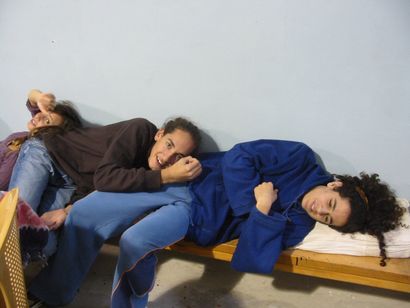Home > Oasis of Peace > Projects & Outreach > Youth Club ("Nadi") > Make way for the youth club
Make way for the youth club
Thursday 10 January 2008
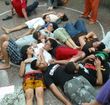
The village Youth Club - popularly called the Nadi (club, in Arabic) - has come a long way in the four years since its establishment. The idea was initially introduced by village resident Dyana Shalufi-Rizek, who had long perceived that the village youth had no official presence in NSWAS. “It is important that they are active in the village,” says Dyana, “because they are the future generation.” She got the ball rolling by making phone calls around the village; which led to a series of meetings among interested parents; and voilà, the Youth Club was born.
Today, the Youth Club is run by three dedicated and passionate women. Maisoun Karaman, the club’s current director is a Palestinian resident of NSWAS. She is a qualified dialogue group coordinator and a feminist multicultural educator, with two teenage children of her own. Ariela Bairey Ben Ishay, a Jewish resident is a college lecturer and educator, and also a mother of two. Dyana Shalufi-Rizek (already mentioned) is a Palestinian resident, a teacher and a former principal of the bi-lingual and bi-national primary school, and mother of two teenage boys. The Youth Club staff includes Palestinian resident, Voltaire Shamshoom, engineer and father of two, and two Jewish residents: Corinne Ben Shabat, psychologist, and Ayelet Shalom, kindergarten teacher. Both have three children.
Maisoun says, “In the beginning, I thought Dyana was crazy... however, she convinced us very quickly.” Maisoun, Dyana and Ariela realized that after school, there was no place for the children to come together; moreover, once the Arab and the Jewish young people graduate from the Primary School, they have no opportunity to meet at all (four years ago, when we established the Youth Club the Jewish teens used to go to Jewish high schools and the Arab teens used to go to Arab high schools). “The effects,” Maisoun says, “were very damaging; Jewish and Arab teens needed support from one another, but there was no way to get it.” For this reason, both Maisoun and Ariela have been 100% committed to the objectives and undertakings of the Youth Club, at least once persuaded by Dyana.
Since then more and more Arabs have been choosing to attend a Jewish high school together with their Jewish peers. The movement of some of the Arabs to the Jewish school represents a difficulty and split within the Arab group and confronts the two groups – the Arabs and the Jews - with many and various challenges. The Arabs discover the hegemonic Jewish Zionist educational system, encountering racism that they did not know in NSWAS. They feel and experience linguistic, cultural and historic alienation. While the Jews feel responsibility and wish to lend support, they don’t always know how. They understand the difficulty but are embarrassed by the change, and naturally want to make friends with other children at the school of their own national group.
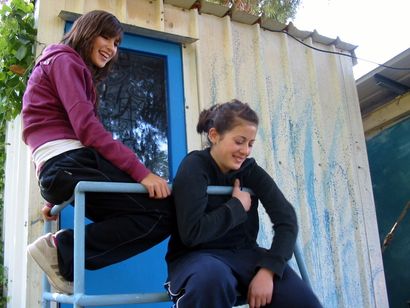
An intriguing idea
Around this time last year, two young women from the village, Layalee Karaman-Abbas (Palestinian) and Nadeen Nashef (Palestinian), came to the Youth Club with a very exciting idea. Two friends in the 10th grade, Layalee and Nadeen, proposed to carry out their community service project (required of all 10th grade students in Israel) in the Youth Club! For seven months (almost an academic school year), they would lead weekly sessions in the Youth Club, working with 1st-3rd graders from the village. The girls implemented art projects, team-building exercises, sports games, tours of the village and surrounding area, outdoor activities, etc. The 1st-3rd grade participants became very fond of these two young women, whom they view as positive role models. Layalee and Nadeen also had fun with this project, evidenced by the fact that they put in many more hours than were expected of them.
The program was so successful, in fact, that two more village 10th graders have decided to carry out their community service project in the Youth Club for the 2007-08 academic year. Alaa Karaman-Abbas (Palestinian) and Reem Haj-yahia (Palestinian) will continue the weekly meetings in the Youth Club, but this time with 4th-6th graders from the village. The activities will be tailored to an older audience, but the idea is the same. In the future, Maisoun hopes to continue to recruit youth leaders who grew up in the village to work in the Youth Club. Maisoun explains that it is ideal to have youth leaders from the village because they understand the needs and concerns of NSWAS children; they are accustomed to working with both Arabs and Jews as they live coexistence everyday; and they are aware of the NSWAS environment (institutions, family ties, relationships, etc.). Furthermore, this is an opportunity for the village youth to foster and strengthen cross-generational relationships as well.
A new generation of NSWAS leaders
The Youth Club implemented its first large-scale project, the Young Leadership Training Program, in July of 2007. A month prior to the program, two pre-training sessions were carried out so that all interested young people could come to learn about the program, build group cohesion and define their individual and collective expectations for the training. These sessions were facilitated by two youth leaders, Elad Vazana (a Jew) and Mona Shaheen (a Palestinian), accompanied professionally in the background by Maisoun and Ariela, and supported all the way by Dyana’s persistence.
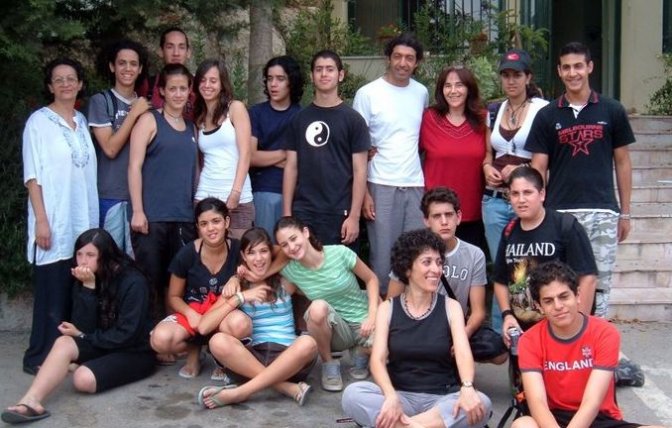
When the time came, fifteen young people from the village attended the intensive, five-day leadership training seminar in the Galilee. The participants delved into team-building, leadership and self-empowerment exercises; the nuts and bolts of conflict resolution, facilitation and mediation; and how to lead community initiatives (led by Jerusalem YMCA senior staff).
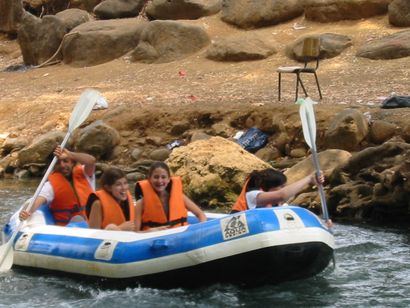
As a result of this seminar, each of the fifteen participants designed and implemented volunteer projects of their own. Over the summer, the newly-trained youth leaders carried out projects such as: leading summer activities for children at the Youth Club; helping staff the Open House Arab-Jewish summer camp hosted at NSWAS; and assisting with the NSWAS Palestinian Summer Camp for the children of Tulkarem Refugee Camp, sponsored by the Humanitarian Aid Project. Maisoun considers the Young Leadership Training Program a great success as it was well-received by both the youth leaders and the younger children they worked with; thus, they will continue this project every two years during the summer.
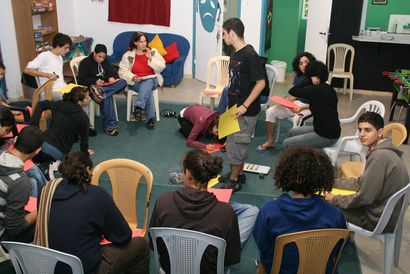
On Saturday, December 15, 2007, the final part of the leadership course was completed. This part dealt with the Arab-Jewish encounter of the participants, with a special emphasis on their multiple identities and how these are influenced by the participants’ various circles of affiliation, such as the nuclear family, the extended family, school, community, friends, etc. The final meeting was facilitated by Ariela Bairey Ben Ishay and Maisoun Karaman.
A lively summer indeed
The Youth Club hired a part-time youth leader as a staff member to carry out regular activities in the Youth Club throughout the summer months. Amit Kita’in, a 24-year-old resident who grew up in the village, willingly took on this challenge – a perfect candidate for this role as (in Dyana’s words) “being close to to the age of the participants enabled him to relate to them on a different level than the adult Youth Club staff.”
For two months, he worked with two groups of teenagers, the 7th-8th graders and the 9th-11th graders, arranging twice-weekly activities for each group. With Ori Sonnenschein, another 24-year-old village member, he organized a continuation of art projects started in June with Canadian volunteer Mia Feuer. By summer’s end, the Youth Club walls were covered with murals, paintings and drawings. For sports, Amit recruited NSWAS resident Nir Sharon, who led a weekly gym program for 1st through 11th graders. Besides all of the above, Amit led a variety of workshops addressing general teen and gender issues, and specific issues faced by young people growing up in NSWAS.
Among the summer’s activities were a screening and discussion of a documentary on NSWAS founder Bruno Hussar and, towards the end of summer, a two-day camping trip in the adjacent woods – an excellent chance for the young people to share and take collective responsibility.
In summing up the summer program, Amit says he hopes that the young people will be able to take from all these experiences something that they can apply in their own lives.
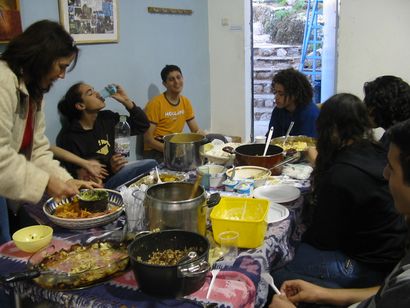
Maisoun adds:
“One of our insightful conclusions from working with the youngsters and learning their needs, is that they are a historical and special generation in many ways. Although their existence here is of their parents’ choosing, no parent has experienced the kind of life that these children have. Actually, we have much to learn from them. These young people are engaged in laying the foundations for a new consciousness and a new reality, which is sometimes rather complex. As a responsible community we need to stop for a moment and listen to them. We need to reflect together how we can support the fulfilment of our dream, which has become a challenging reality for our children.”
“Amit, with the ease and sensitivity of someone who has grown up in this bilingual village, was able to establish a special connection with the young people. Observing this made us realize that even the most experienced guides from outside are less successful at understanding and empowering our youth than a person who has experienced their reality first-hand.”
Building ties through drama
The most recent program (through the end of December 2007) at the Youth Club is a series of interactive drama workshops led by Tamar Cohen, a BA student from Sweden doing her final thesis project here at NSWAS. The youth were divided into two groups (7th - 8th graders in one group; 9th -11th graders in the second). Tamar conducted a weekly drama workshop with each group. She said the program is meant to foster positive youth development by strengthening qualities like self-esteem, verbal and non-verbal communication skills, responsibility, cooperation, self-reflection and empathy – which she defines as “the ability to understand the other’s experience”. While the drama workshops don’t tackle intergroup conflict head-on, Tamar believes that teens who acquire these traits will be more accepting, more tolerant and thus, more likely get past any conflict (political or personal) that may arise amongst them.
Tamar started each workshop with a physical warm-up to get the circulation and creative energy flowing – games, music, dance – all help to dissolve inhibitions. “The session is very interactive... above all, I want them to have fun!” They learn various drama and theatre techniques, practising with experiential exercises (a.k.a. games) – charades, pantomime, non-verbal communication games, improvisation, etc. After a few sessions, she pushed the youth even further by encouraging them to design and act out (mostly improvise) their own short sketches, requiring a lot of imagination and self-confidence. The workshops aren’t necessarily all fun and games, however. With the older group (the 9th -11th graders), Tamar debriefed each session with a 20-minute self-reflection period, exploring how drama skills and exercises can apply to their everyday lives.
Before coming to Neve Shalom Wahat al-Salam, Tamar expected to find slight tensions along Jewish-Arab lines. However, she has been delightfully pleased to find that group cohesion among the young people of the Youth Club is remarkably strong. She says the sense of trust, especially within the older group (which has done the leadership course), is very clear; “it is as if the political conflict and greater reality do not exist here in NSWAS,” she remarks. Considering Dyana and Maisoun’s original rationale for the creation of the Youth Club – to rekindle relationships among the Jewish and Arab youth – it appears that at least one primary objective has been achieved: the nurturing of friendship, solidarity, open communication and a capacity to cope together with the changing loyalties and complex tensions that are part of life!
Looking forward
Both Maisoun and Dyana expressed optimism about their accomplishments thus far, as well as the future. Besides recruiting more youth leaders from the village, they would like to see the Youth Club expand, in terms of its physical space and target-group, in the years to come. Physically, they would like to see the creation of a second club for the older youth (12th graders and recent graduates). Realizing that this age group has interests, needs and concerns that differ from those of the younger children, they believe it would be more sensible for these young adults to have their own space. In terms of its target group, the Youth Club could serve not just young people from the village, but also other students and graduates of the Primary School, children of NSWAS employees and youth from surrounding region. These dreams may be big... but considering what has already been attained, why not?
